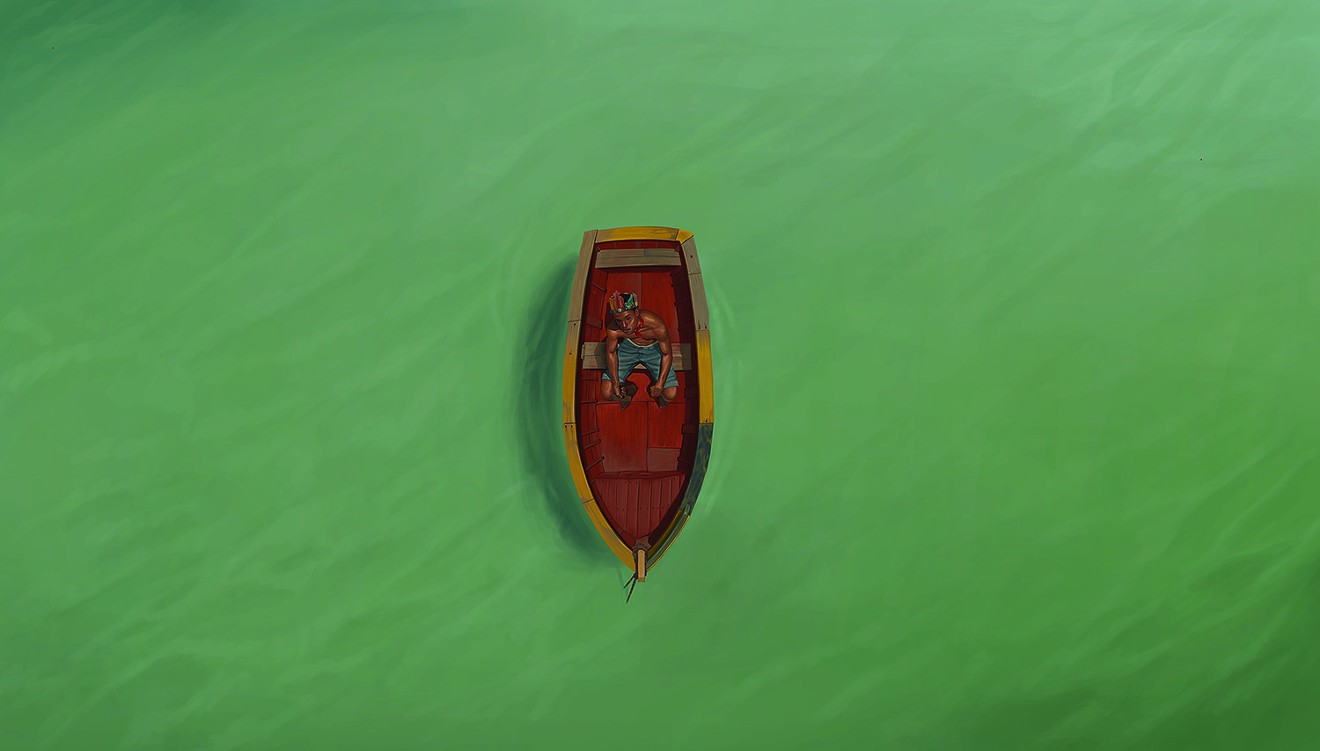That’s why on Friday, December 6, she and fellow Caribbean art curators David Scott, Nijah Cunningham, and Juliet Ali will take over the Little Haiti Cultural Center with the exhibition "The Visual Life of Social Affliction." The collection was designed to reflect the emotional and physical wounds endured by Caribbean peoples as the result of a long history of imperialist activities and marginalization.
“I am a huge fan of thematic, tightly curated shows, and also of giving global Caribbean art space to enunciate itself in a contemporary way," James says. "Art Basel is the ultimate now space,” She notes the curatorial team chose artists who would “engage more critical issues facing the Caribbean based on their demonstrated concern with these subjects.”
Sponsored by the Small Axe Project — otherwise known as SX, a New York-based Caribbean intellectual and artistic non-profit organization — the exhibition is the tenth of Miami’s Global Caribbean Series, and likely the most diverse in terms of the social issues it addresses. SX originally began in Jamaica in 1997 as a journal of the University of the West Indies, but it has since expanded into assembling art shows. Hence, the work artists will be presenting at this week’s show have been paired with art critics in order to produce new pieces in written and visual forms.
This latest project began as a May 2018 symposium at Miami’s Lowe Museum and grew into an exhibit exploring everything from the high cost of colonialism and tourism to the devastation of maroon societies.
“We wanted to explore an area of arts and scholarship that was understudied but vitally present as it related to the region, and [to] develop scholarship around this work while being led by the work itself,” says James.
Beautiful and haunting, the pieces invite viewers to take a closer look at the marginalization of people of color through the lens concerns such as police brutality, human trafficking, and the very objectification or rejection of blackness itself.
Ricardo Edwards
Jamaican artist Ricardo Edwards, the youngest participant in the event, will be exhibiting his painting Pirate Bwoy, featuring a young black man sitting in a dinghy resting in a vast green sea.”We are looking at the man from above, from a kind of god-like perspective," James says. "At first the beauty of the water and the precarity of the boat is all you see, but as you look closer, the young man looks back at the viewer and you realize that he has a gun in his hand. There is a hopelessness presented that is palpable. He looks up toward God and the viewer in a way that asks, Why shouldn’t he do what he came to do on that boat without oars in the middle of the sea?"
Rene Peña
Cuban artist Rene Peña places feathered wings on a black man for photos exploring the absence of black angels in art history. Depicted from the back on which those wings grow, the angel’s torso tilts toward the camera, as though he has just sensed the viewer’s presence.“Untitled (archangel) inserts itself into the totalizing narratives of Western art history and unsettles the claims this history makes through historic black absence,” writes James in an essay she wrote for the corresponding book for "The Visual Life of Social Affliction."
She adds, “This image objectifies and then disassembles this void by formally asserting the sublime qualities of blackness within a transcendent form.”
She goes on to write about how Peña's piece “conceptually disavows any reading of black skin, black surfaces, and blackness itself as signs of moral darkness” seen throughout 18th-century artwork.
Belkis Ramírez
The objectification and commercialization of women is also featured in the works of late Dominican artist Belkis Ramírez, for whom the show is dedicated to in light of her passing last May. Her work Volare features black and white images of women on white bedsheets to speak to the widespread issue of human trafficking.“These unknown, anonymous women have been unveiled, looking down upon us," writes Trinidadian artist Marielle Barrow, Program Coordinator at the Caribbean Development Bank in Washington, DC. "Though their billows seem poised for flight, their forms are anything but in flight... We are, in this moment, acutely uncomfortably aware of the coordinates of our point of departure and the journey that our migration might entail.”
This collection of intense art pieces and the written reflections accompanying them gained widespread support from funders such as the Ford Foundation, the Warhol Foundation, The University of Miami School of Arts and Sciences, and the Miami-based Green Foundation. James says it’s easy to see why the works have attracted this degree of attention.
“There are so many lessons of history and culture contained in the Caribbean as a historically imagined geographic place and a critical and conceptual space." she says. "Everything the world is facing is being faced — or has been faced — in this microcosm is simultaneously local and global."
The Visual Life of Social Affliction. 10 a.m. Friday, December 6, at the Little Haiti Cultural Center, 225 NE 59th St., Miami; 305-915-1951; haitianculturalartsalliance.org. Admission is free, but RSVP is required via [email protected].












